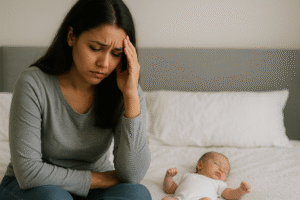Motherhood and Matrescence
Having a baby is life changing. Not only are you learning how to care for a child, but you are developing a new identity as a mother. This transformation is sometimes called Matrescence and refers to the physical, psychological, emotional, social, and spiritual changes that occur during the postpartum stage. You may suddenly see your life and relationships in a new light and may develop a new worldview and set of values.


Childbirth Can Be Traumatic
You may go into motherhood expecting to feel incredible, immediate love for your baby. You may feel pressure to respond and bond in a particular way. There is a great deal of pressure to “bounce back” and resume your previous life. Your life is different now; you are different now. You have been through something powerful, transformative, and possibly traumatic. It is incredibly important to take it slow, be gentle with yourself, and allow your body, mind, and spirit to heal after the birth of your baby.
Baby Blues and Postpartum Depression
It is normal to feel emotional following childbirth. The experience of pregnancy and motherhood stirs up a variety of thoughts, feelings and hormonal changes. It is normal to have mixed emotions, doubts, and fears. Some thoughts and feelings may surprise or even scare you. Even up to two weeks postpartum, most moms experience the “baby blues” which are characterized by mood swings, sadness, fatigue, irritability, worry, crying spells, changes in appetite, and difficulty sleeping. However, if these symptoms persist and intensify longer than two weeks, you might be experiencing postpartum depression.
Studies show that 1 in 5 women and 1 in 10 men experience postpartum depression. Symptoms range from mild to severe and may develop into a rare postpartum mood disorder called postpartum psychosis. If symptoms persist past 2 weeks, it is important to seek professional help from a doctor and counselor right away, even before your six-week postpartum check-up. Without treatment, postpartum depression can persist for months or even longer.
Postpartum depression symptoms may include: severe mood swings, tiredness, panic attacks, feeling of guilt and hopelessness, anger, anxiety, uncontrollable crying, isolating from friends and family, insomnia, thoughts of death, harming yourself, or harming your baby, and a loss of interest in activities you previously enjoyed. Learn more from WomensHealth.gov.

Counseling Can Help
Counseling can be a very helpful treatment for postpartum depression. Your doctor may suggest taking medication in combination with counseling in order to gain some relief from more severe symptoms. Visit Postpartum Support International for resources and support groups near you. You can also explore our own Trauma-Informed Counseling services if childbirth has felt overwhelming or distressing.
You are not to blame.
With help, you will be well.
Helping a Loved One
People with postpartum depression may not know they need help. They may be unaware of the symptoms of depression. If you think a friend or loved one is at risk, encourage them to get help right away.
Disclaimer: Suicidal Thoughts
If at any point you have thoughts of harming yourself or your baby, call 911. You can also contact the 24/7 suicide hotline at 988. In addition, reach out to a close friend or loved one and call your doctor and a counselor.
Explore More Services
Rivers Edge Counseling offers a range of supportive services to help you thrive. Learn more about:
